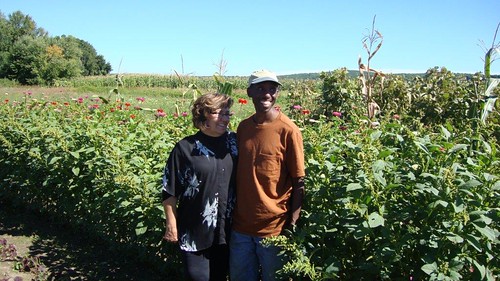
Growing up in Tanzania, East Africa, Sangiwa Eliamani became a skilled farmer producing rice, millet and cotton throughout the year, using typical hand tools. He had no concerns about seasonal timing or finding markets for his crops, until he moved to the United States and attempted to farm in Massachusetts.
“Over there [in Tanzania] it’s very different,” he said. “We don’t have this limited time to grow. We have easier access to land and markets to sell our products.”
Sangiwa moved to the U.S. in hopes of better opportunities, but it seemed his passion for farming may be put on hold when he discovered high land prices, short growing seasons and complex crop marketing.
Though this realization came hard, Sangiwa could not stop thinking about cultivating the land. That’s when he found World Farmers/Flats Mentor Farm, an organization that assists and supports small farmers of diverse ethnic backgrounds by providing them with access to land, farming infrastructure and marketing assistance needed to sustain successful farming enterprises.
World Farmers/Flats Mentor Farm is one of several organizations that have partnered with the Massachusetts Farm Service Agency (FSA) to help small, beginning and specialty farmers start or expand their operations. Through its Outreach and Education division, FSA works to develop partnerships with local, regional and national agricultural organizations through more than 2,200 county FSA offices nationwide.
Since 1999, more than 200 beginning farmers have received USDA and FSA assistance, including microloans and the Non-Insured Crop Disaster Assistance Program (NAP), as a result of the World Farmers/Flats Mentor Farm and FSA partnership.
“Because of this partnership, many farmers have rediscovered their connection to and passion for agriculture,” said FSA County Executive Director Kip Graham.
Sangiwa was one of them.
This summer, Sangiwa was approved for a microloan and used some of FSA’s beginning farmer benefits like the fee waiver for NAP. He now rents two acres of land and the dream of purchasing his own farmland seems possible. The microloan helped Sangiwa purchase his own rototiller, farmers’ market tent, coolers, seeds and fertilizer.
The FSA microloan program is available to all farmers, including beginning, small and mid-sized farmers, providing up to $50,000 in loans using a simplified application process. Since the program began in 2013, over 20,000 farmers received microloans. About 70 percent of microloans are issued to beginning farmers and 55 percent to first-time FSA borrowers.
“My biggest fear was that [FSA] wouldn’t accept me. It wasn’t so,” said Sangiwa. “With beginning farmer support and FSA’s microloan, I now have the equipment and resources I need to continue and expand my operation.”
For more information on FSA microloans, visit www.fsa.usda.gov/microloans. Details on the NAP program can be found at www.fsa.usda.gov/nap. To find your nearest FSA county office, visit http://offices.usda.gov. And to learn more how USDA can help beginning farmers, visit newfarmers.usda.gov.



